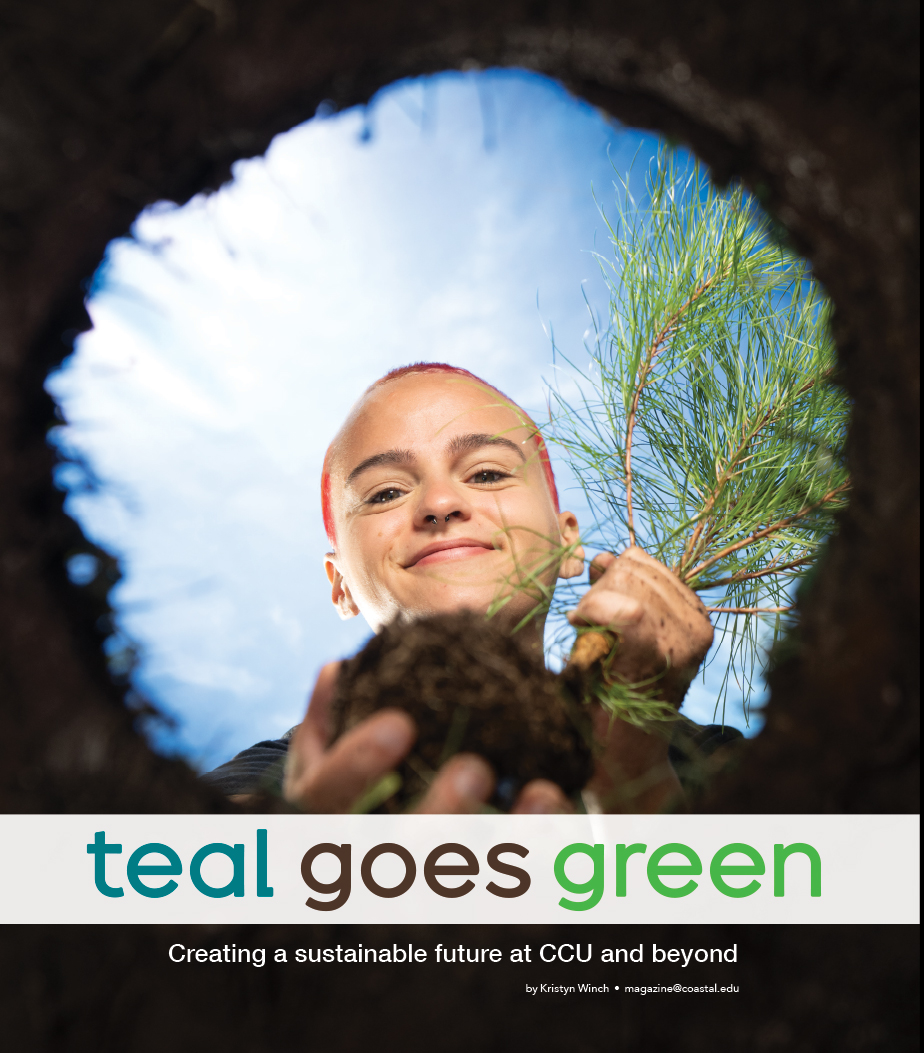
At Coastal Carolina University, it is easy being green… and not just because teal is one of the school’s colors.
Sustainability is of high importance throughout campus, and the University’s dedication to ecological balance and environmental care are reflected in academics, athletics, dining, housing, special events, and student life. CCU has implemented various initiatives to reduce waste, encourage recycling/reusing, and create a sustainable future in Conway and beyond.
Sustain Coastal was established in 2005. Efforts have been generously supported by TD Bank Group, a North American financial institution with operations in South Carolina and a recognized global leader in sustainability, through a 2013 gift establishing the TD Campus and Community Sustainability Initiative. Services coordinated through this initiative include recycling, food waste composting, water refill stations, energy conservation, alternative transportation, and education and outreach programs. TD’s support has also funded green efforts in athletics, including the installation of artificial playing surface at Brooks Stadium. CCU’s TD Sports Complex encompasses the football, baseball, softball, basketball, soccer, and women’s lacrosse venues.
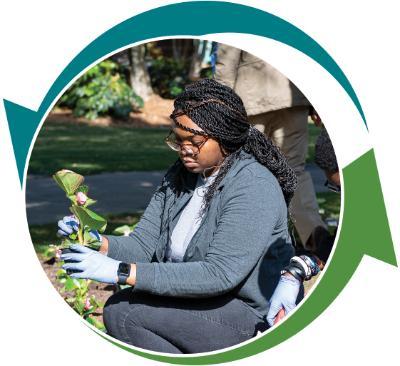
Some of the University’s featured green events are the Farmers Market, Earth Month events, Pop-Up Thrift Shop, Arbor Day tree giveaway, John Brong Planting Day, which honors CCU’s late greenhouse manager and gives the CCU community an opportunity to plant flowers and trees on campus, and the end-of-academic-year Campus Salvage Sale, where unwanted items from residence halls, including bicycles, furniture, mini refrigerators, and more, are sold, with proceeds going to student scholarships. Sustain Coastal also offers multiple opportunities for students to get involved, from collecting recyclables on campus as a member of the Green Team to promoting sustainable living as Eco-Rep Leaders. Students can also join the new Sustainability Club.
“Sustain Coastal hopes to inspire the campus community to adopt more sustainable lifestyles while becoming a model and resource for the local community,” said Darcy Coughlan, Sustain Coastal associate director. “Much of the work we do is making sustainable living easier and more accessible for everyone, while showcasing how sustainability can be incorporated into events, operations, classroom learning, and more.”
According to Coughlan, Sustain Coastal is a relatively small department for the work that is done. The area has three full-time staff members and 17 student workers. The Green Team is responsible for daily recycling on campus, and there are about 10-11 team members on average per year.
“Putting that in perspective, they collect recyclables from 42 buildings each day, and there is roughly one Green Team member per 1,000 campus members,” said Coughlan.
 Student volunteers sort through trash and recyclables after every home football game.
Student volunteers sort through trash and recyclables after every home football game.
![]() During the 2022 football season, the Sustain Coastal team diverted an average of 73% of all material generated in Brooks Stadium from going into the landfill. Specifically, 3,800 pounds of compost; 9,300 pounds of aluminum cans and plastic bottles; and 2,600 pounds of cardboard. This is in addition to the 3,700 pounds of aluminum cans and plastic bottles collected from general and student tailgates.
During the 2022 football season, the Sustain Coastal team diverted an average of 73% of all material generated in Brooks Stadium from going into the landfill. Specifically, 3,800 pounds of compost; 9,300 pounds of aluminum cans and plastic bottles; and 2,600 pounds of cardboard. This is in addition to the 3,700 pounds of aluminum cans and plastic bottles collected from general and student tailgates.
In 2010, CCU signed the American College and University Presidents’ Climate Commitment, developed in conjunction with Second Nature, ecoAmerica, and Association for the Advancement of Sustainability in Higher Education (AASHE), committing the University to strive toward climate neutrality as an institutional goal.
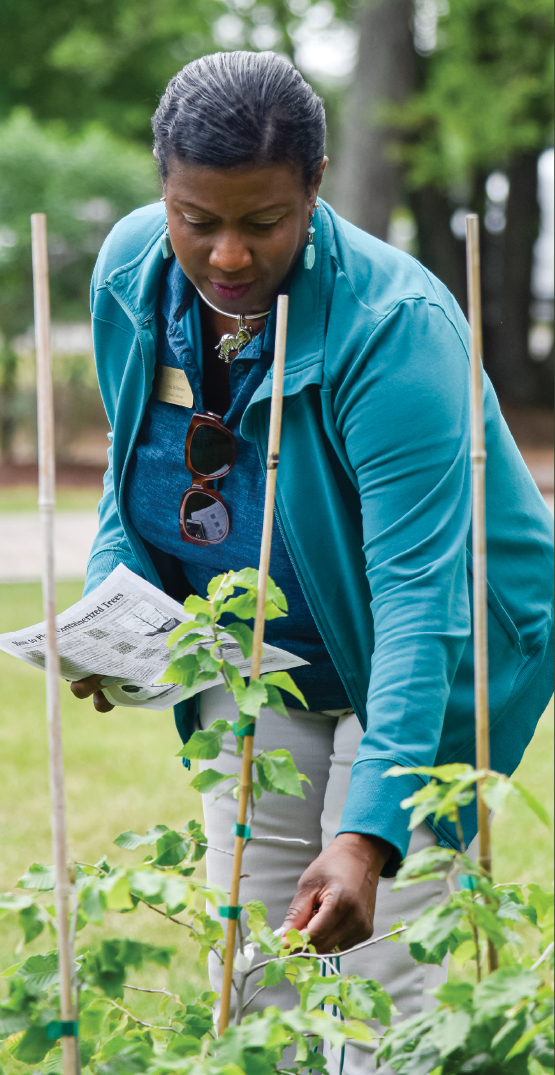
Yvette Jefferson, Wall College academic advisor, examines a tree during CCU’s Arbor Day Tree Giveaway.
Six months after taking office in January 2021, CCU President Michael T. Benson established the President’s Council for Sustainability and Coastal Resilience (PCSCR), which is led by Steve Harrison, CCU’s vice president for auxiliary enterprises and first-ever chief sustainability officer. The council’s work includes creating and publishing a sustainability and coastal resilience strategic plan for the University and establishing formal, collaborative connections. It also works to create a more sustainable campus, centering sustainability in the University’s curriculum and student services, and serving the surrounding communities to build toward a sustainable future.
“It is clear that our sustainability efforts are increasingly a factor in a prospective student’s choice to come to Coastal or not,” said Harrison. “Recent research by AASHE found that 45% of students considered environmental sustainability in their college enrollment decision and 85% said it was at least somewhat important for their campus to prioritize sustainability. I think we can be the college of choice – the first choice – for South Carolinians, and many others, who consider sustainability when deciding where to pursue their post-secondary education. The PCSCR is critical in coordinating and connecting CCU’s work to make that true. Beyond making the campus greener, the council is working to support research, co-curricular programming, and operational improvements through its annual sustainability grants.”
In April, PCSCR hosted its inaugural Sustainability Symposium, an initiative to connect the community with local, regional, and national environmental experts. The symposium, themed “Creating a Resilient Future,” featured a keynote address by Katharine Hayhoe, chief scientist for the Nature Conservancy and a distinguished professor and chair at Texas Tech University. The day also included research presentations from undergraduate students, networking opportunities, panel discussions on intersectional environmentalism and climate resilience, and sustainability grant award presentations.
![]() Sustain Coastal is a relatively small department for the work that is done. The area has three full-time staff members and 17 student workers. The Green Team is responsible for daily recycling on campus, and there are about 10-11 team members on average per year.
Sustain Coastal is a relatively small department for the work that is done. The area has three full-time staff members and 17 student workers. The Green Team is responsible for daily recycling on campus, and there are about 10-11 team members on average per year.
The symposium was funded in part by a $500,000 donation from Aramark Higher Education, CCU’s contracted food service provider. Aramark has been an important partner in campus waste diversion efforts. In 2022, 127.40 tons of compostable material were diverted from the dining halls. Since the composting program started in 2015, CCU has diverted 555 tons of compostable material (e.g., food waste, paper products, compostable products) from entering the landfill.
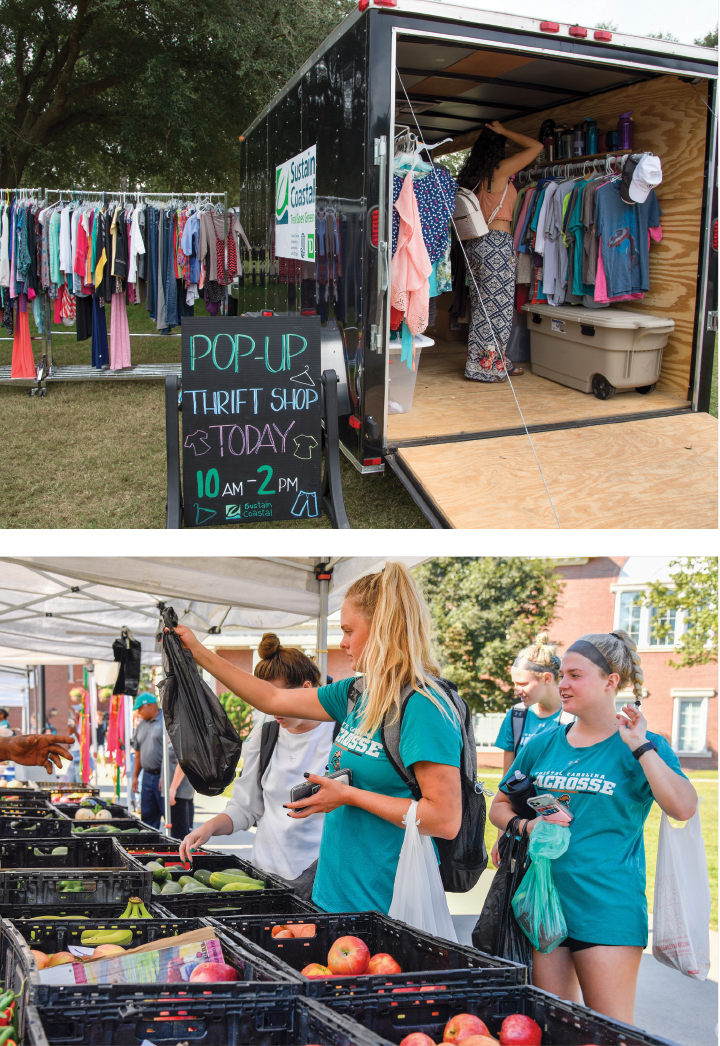
The Pop-Up Thrift Shop (top), Farmers Market (middle), and annual John Brong Planting Day (below) are some of Sustain Coastal’s most popular campus events.
A priority of the PCSCR has been to complete a greenhouse gas (GHG) inventory to comprehensively measure CCU’s direct and indirect GHG emissions between fiscal years 2018-2021. The report provides a framework for the University to continuously monitor emissions and reduce emissions moving forward. During the past two years, Sustain Coastal has also completed a comprehensive sustainability assessment – known as the Sustainability, Tracking, Assessment & Rating System (STARS).
“These assessments have been critical to our ability to measure and assess our sustainability performance as an institution, and also identify major sources of emissions,” said Coughlan, “We now know our strengths and the areas we need to continue to make progress. We now know the emissions associated with the energy we use, the fuels we burn, the waste we produce and manage, and the goods and services we purchase.”
In recognition of its sustainability achievements, CCU recently earned a STARS Gold rating from AASHE. The STARS program measures and encourages sustainability in all aspects of higher education. CCU’s 70.62-point score is the highest among South Carolina public colleges and universities and marks an upward achievement from the previous year’s Silver rating. The STARS Gold ranking was the culmination of a year’s worth of data collection, surveys, and other research led by Coughlan.
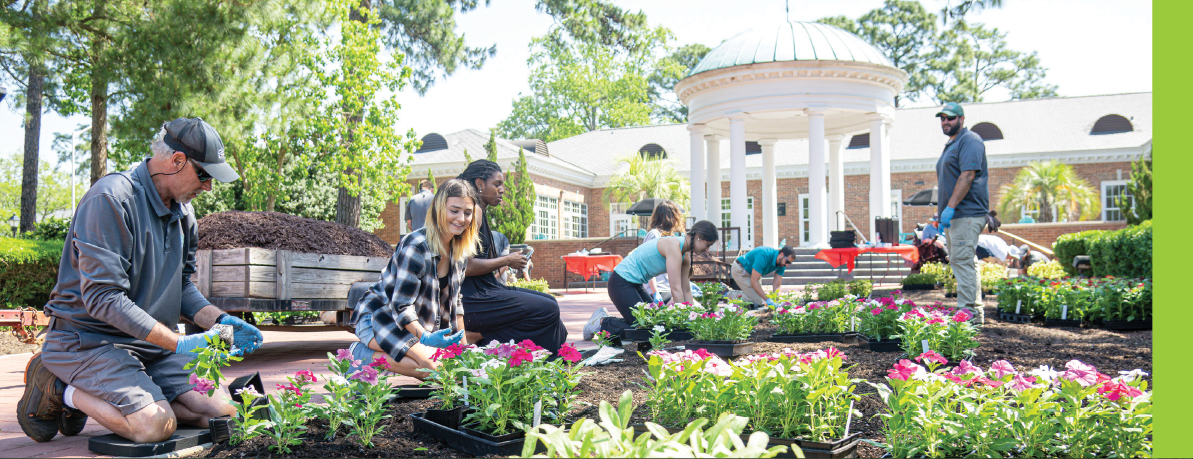
“Our team is thrilled to have reached STARS Gold,” she said. “This rating reflects the sustainability progress made over the past year through initiatives such as the completion of the University’s first comprehensive greenhouse gas emissions inventory and the establishment of a sustainability grant at CCU. It would not have been possible without the valuable contributions of many departments across campus, and the President’s Council for Sustainability and Coastal Resilience.”
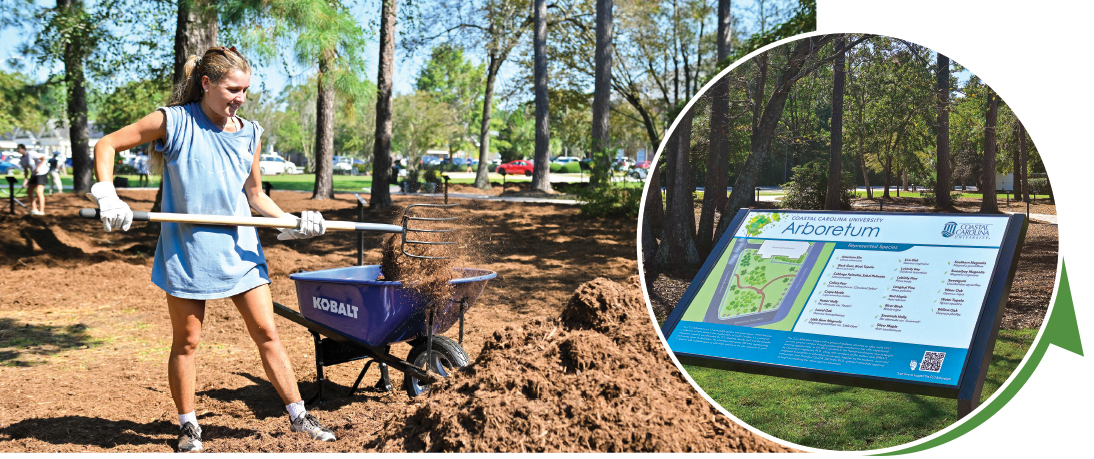 Students were the ones who proposed the establishment of CCU’s 1.5-acre arboretum, a multipurpose area that serves as a public garden, research facility, and green space. Located adjacent to Wheelwright Auditorium, the space features a collection of trees that are indigenous to the area and found throughout the campus.
Students were the ones who proposed the establishment of CCU’s 1.5-acre arboretum, a multipurpose area that serves as a public garden, research facility, and green space. Located adjacent to Wheelwright Auditorium, the space features a collection of trees that are indigenous to the area and found throughout the campus.
Academically, CCU students have the opportunity pursue an undergraduate degree in sustainability and coastal resilience. Unique to this program, students apply knowledge and skills to the issues specifically facing coastal communities through coursework that focuses on coastal resiliency. CCU is the first public institution in South Carolina to offer an undergraduate degree with a focus on sustainability, and the only institution in the nation to offer a degree in sustainability and coastal resilience. Students can pursue a Bachelor of Arts degree with a focus on either policy and culture or business and economics, or a Bachelor of Science degree with a focus on science and ecosystems.
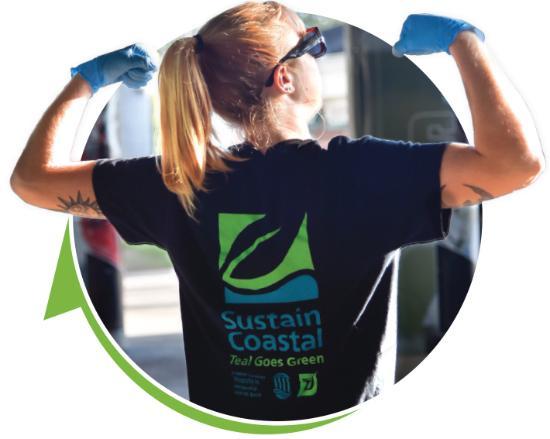
CCU’s sustainability efforts expand to sporting events as well. The University was recently recognized by the National Wildlife Federation and Campus Race to Zero Waste as the top-ranking campus for the waste minimization per capita category for the 2022 GameDay Football Zero Waste Touchdown Challenge. The challenge is a nationwide competition among colleges and universities to reduce and recycle the waste generated at home football games.
Zero waste efforts started at CCU in 2015 with one home football game per season. Now, every Chanticleer home football game is a zero-waste effort, providing fans with opportunities to recycle and compost their waste on game days. During the 2022 football season, the Sustain Coastal team diverted an average of 73% of all material generated in Brooks Stadium from going into the landfill. Specifically, 3,800 pounds of compost; 9,300 pounds of aluminum cans and plastic bottles; and 2,600 pounds of cardboard. This is in addition to the 3,700 pounds of aluminum cans and plastic bottles collected from general and student tailgates.
“I am particularly proud of Sustain Coastal for earning this recognition,” said Coughlan. “Zero Waste football is hard work and requires a great deal of planning. Our team shows up to each game – rain or shine – with positive attitudes, prepared to do what can only be described as a physically demanding and dirty job. Being recognized for having one of the strongest zero waste programs in the country is immensely rewarding and a reflection of the commitment our team has regarding making CCU a more sustainable campus.”
Student involvement is a big part of why CCU’s sustainability efforts continue to grow. Students were the ones who proposed the establishment of CCU’s 1.5-acre arboretum, a multipurpose area that serves as a public garden, research facility, and green space. Located adjacent to Wheelwright Auditorium, the space features a collection of trees that are indigenous to the area and found throughout the campus. Since its opening in Fall 2022, the arboretum has expanded to include the entire 322-acre main campus. The University is conducting an inventory of all the trees in the arboretum and mapping them in an interactive platform called TreePlotter.
As CCU continues to grow, sustainability efforts will surely grow with it. Cassie LaValley ’17, who earned a bachelor’s degree in interdisciplinary studies with a focus on environmental sustainability at CCU, was involved with various Sustain Coastal initiatives as an undergraduate. She now works on campus as a sustainability coordinator while pursuing an MBA with a sustainability concentration. LaValley has enjoyed watching sustainability support and engagement on campus grow during the last decade.
“Mindset around sustainability continues to evolve in a very encouraging way across campus,” said LaValley. “It feels like it’s becoming a part of our culture at CCU. When I was a student Eco-Rep Leader, I often found it challenging to engage the campus community. Now it’s the opposite; we’re being sought out for our knowledge and the opportunities we provide [through Sustain Coastal] around sustainability.” Harrison said the University’s work in this area will have a lasting impact.
“I’m consistently reminded that Coastal Carolina University’s sustainability efforts are one of the clearest expressions of our mission,” said Harrison. “Through the operational and educational work of Sustain Coastal, we are helping develop students who are knowledgeable in their chosen fields and prepared to be global citizens. CCU’s deep commitment to sustainability means that in every way that matters, we can meet the current needs of our students, staff, faculty, fans, alumni, and guests without compromising our ability to meet the needs of future Chanticleers.”
![]()
Since the composting program started in 2015, CCU has diverted 555 tons of compostable material (e.g., food waste, paper products, compostable products) from entering the landfill.
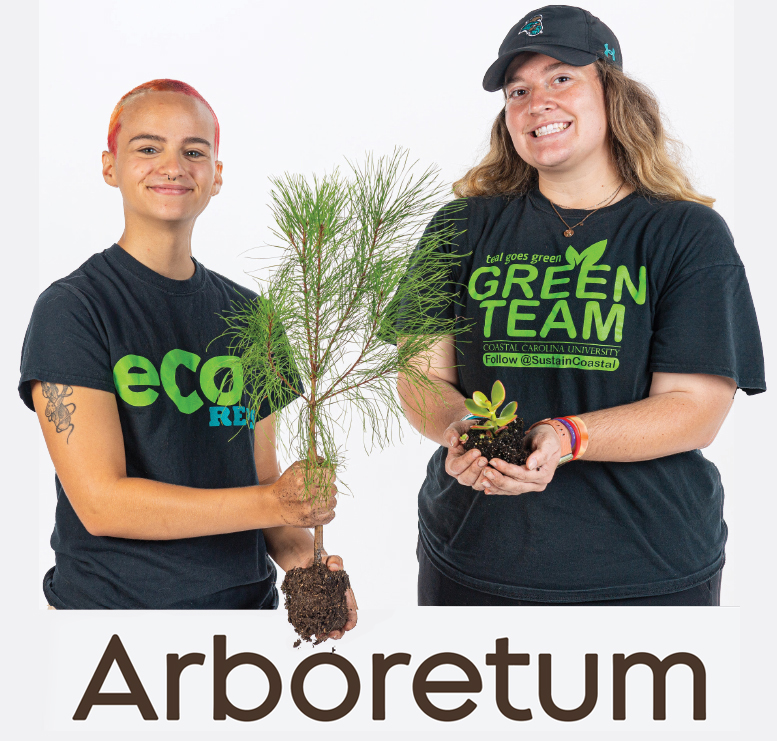
The CCU Arboretum features trees that are part of the primary native species collection.
Represented Species:
• American Elm
Ulmus americana
• Black Gum, Black Tupelo
Nyssa sylvatica
• Bald Cypress
Taxodium distichum
• Cabbage Palmetto, Sabal Palmetto
Sabal palmetto
• Callery Pear
Pyrus calleryana var. ‘Cleveland Select’
• Crape Myrtle
Lagerstroemia indica
• Foster Holly
Ilex attenuata var. ‘Fosteri’
• Fringe Tree
Chionanthus virginicus
• Laurel Oak
Quercus hemisphaerica
• Little Gem Magnolia.
Magnolia grandiflora var. ‘Little Gem’
• Live Oak
Quercus virginiana
• Loblolly Bay
Gordonia lasianthus
• Loblolly Pine
Pinus taeda
• Longleaf Pine
Pinus palustris
• Red Maple
Acer rubrum
• River Birch
Betula nigra
• Savannah Holly
Ilex attenuata var. ‘Savannah’
• Silver Maple
Acer saccharinum
• Southern Magnolia
Magnolia grandiflora
• Sweetbay Magnolia
Magnolia virginiana
• Sweetgum
Magnolia grandiflora
• Water Oak
Magnolia grandiflora
• Water Tupelo
Magnolia grandiflora


